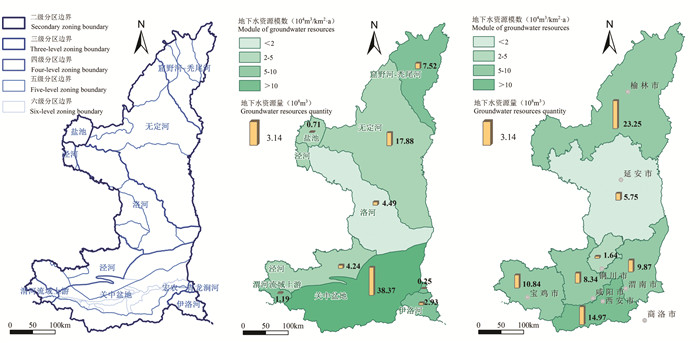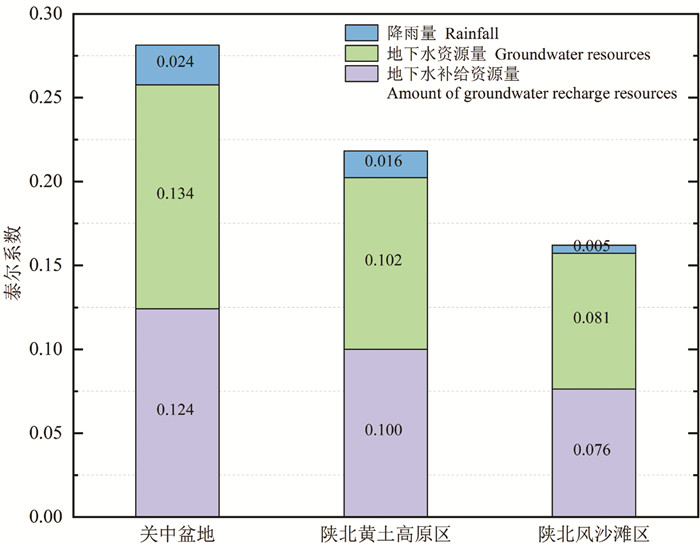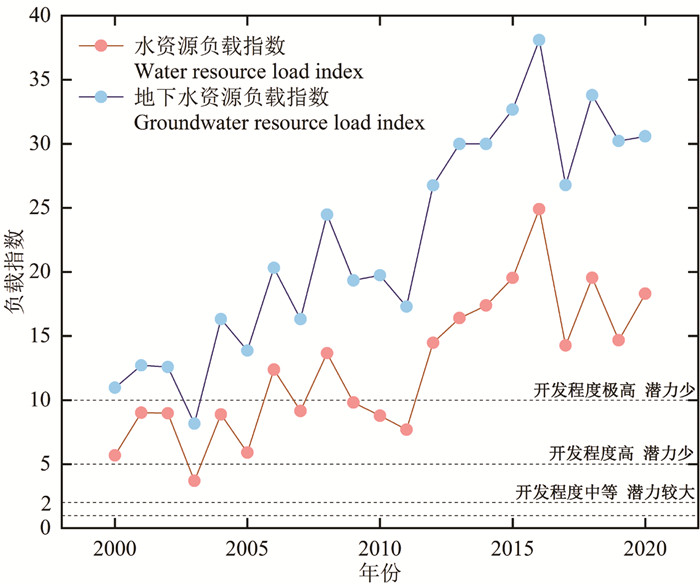Distribution characteristics, influencing factors and development potential of groundwater resources in Shaanxi Province of the Yellow River Basin
-
摘要:
研究目的 陕西省是黄河流经的重要省份,揭示黄河流域陕西省地下水资源禀赋,探究地下水资源分布特征、影响因素及开发利用潜力可为黄河流域生态保护和高质量发展提供重要支撑。
研究方法 本文以黄河流域陕西省为研究区,划分评价单元,评价地下水资源量;引入泰尔指数从人口和面积两方面评估各区域地下水资源分布差异;通过灰色关联分析探究地下水资源分布的影响因素及影响程度;利用水资源负载指数和开采潜力指数,定量评价各行政区地下水资源开发利用程度及潜力。
研究结果 黄河流域陕西省多年平均地下水资源量为77.59×108 m3/a,地下水资源分布差异较大,各评价单元中关中盆地区地下水资源人口和面积分布差异最大,行政区中延安市与西安市地下水资源分布差异最大。降水是全区地下水资源最主要的影响因素,其次为人类活动尤其农业灌溉,地表水因素对渭南市、榆林市有较大影响,蒸散发对延安、榆林、宝鸡地下水资源有一定影响。研究区地下水开采潜力指数介于0.8~2.5,地下水资源负载指数呈现上升趋势,较全国属于高负载区,各行政区开发利用潜力差异明显,开发程度较高区域集中在关中城市群,西安市开发程度最高,铜川市开发利用程度最低。
结论 黄河流域陕西省地下水资源及开发潜力分布差异大、影响因素多元,应进一步加强水资源优化配置与分区分类调控,构建更加协调的资源发展格局。
Abstract:This paper is the result of hydrogeological survey engineering.
Objective Shaanxi Province is an important province where the Yellow River flows. Revealing groundwater resource endowment, exploring distribution characteristics, influencing factors and exploitation and utilization potential of groundwater resources can provide important support for ecological protection and high-quality development of the Yellow River Basin.
Methods Taking Shaanxi Province of Yellow River Basin as the study area, the groundwater resources are evaluated by dividing evaluation units. The Thiel index is introduced to assess differences in the distribution of groundwater resources by region in terms of both population and area. Grey correlation analysis is used to explore the influencing factors and degree of groundwater resource distribution. The exploitation and utilization degree and potential of groundwater resources in each administrative region are evaluated quantitatively by means of water resource load index and exploitation potential index.
Results The annual average groundwater resource in Shaanxi Province of the Yellow River Basin is 77.59×108 m3/a. The regional distribution of groundwater resources varies greatly. The population and area distribution of groundwater resources in Guanzhong Basin area of each evaluation unit has the largest difference, and the difference of groundwater resources distribution between Yan'an City and Xi'an City is the largest. Precipitation is the most important factor affecting groundwater resources in the whole region, followed by human activities, especially agricultural irrigation. Surface water factors have a great impact on Weinan and Yulin cities, and evapotranspiration has a certain impact on groundwater resources in Yan'an, Yulin and Baoji. The groundwater exploitation potential index of the study area is between 0.8 and 2.5, and the groundwater resource load index shows an upward trend, which is a high load area compared with the whole country. The spatial difference of development and utilization potential of each administrative region is obvious. The region with high development degree is concentrated in Guanzhong City Group. Xi'an City has the highest development degree, whereas Tongchuan City has the lowest development and utilization degree.
Conclusions The distribution of groundwater resources and development potential in Shaanxi Province of the Yellow River Basin is very different, and the influencing factors are multiple. Therefore, it is necessary to further strengthen the optimal allocation of water resources, zoning and classification regulation, and build a more coordinated pattern of resource development.
-

-
表 1 水资源负载指数分级标准
Table 1. Classification standard of water resources load index

表 2 基础数据内容与来源
Table 2. Basic data content and source

表 3 黄河流域陕西省地下水资源量表(2000—2020年)
Table 3. Groundwater resources in Shaanxi Province of the Yellow River Basin (2000-2020)
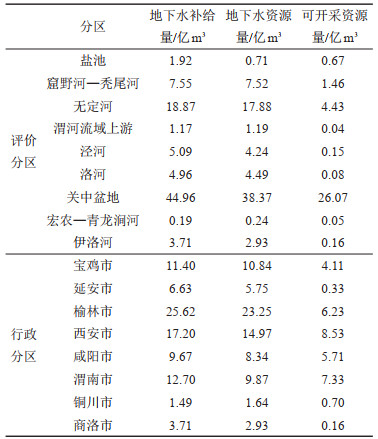
表 4 黄河流域陕西省各行政区地下水资源分布情况
Table 4. Distribution of groundwater resources in administrative regions of Shaanxi Province of the Yellow River Basin

-
Cheng Xiaoxia, Sun Xian, Fang Jiangang, Mao Mingce, Liang Qichen. 2012. Impacts of climate change on water resources in Shaanxi Province during past fifty years based on regression models[J]. Bulletin of Soil and Water Conservation, 32(2): 114-121 (in Chinese with English abstract).
Cui Yali, Zhang Ge, Shao Jingli. 2004. Classification and characteristics of groundwater system in the Yellow River Basin[J]. Resources Science, 26(2): 2-8 (in Chinese with English abstract).
Duan Lei. 2004. Evaluation and Analysis of Groundwater Resources in Shaanxi Province of Yellow River Basin[D]. Xi'an: Chang'an University (in Chinese with English abstract).
Gao Bo. 2007. Evaluation of Sustainable Utilization of Water Resources in Shaanxi Province Based on DPSIR Model [D]. Xi'an: Northwestern Polytechnical University (in Chinese with English abstract).
Han Shuangbao, Li Fucheng, Wang Sai, Li Haixue, Yuan Lei, Liu Jingtao, Shen Haoyong, Zhang Xueqing, Li Changqing, Wu Xi, Ma Tao, Wei Shibo, Zhao Minmin. 2021. Groundwater resource and eco-environmental problem of the Yellow River Basin[J]. Geology in China, 48(4): 1001-1019 (in Chinese with English abstract).
He Wei, Wang Yuling. 2021. Calculation of urban water resources utilization efficiency in the Yellow River basin and analysis of its influencing factors[J]. Acta Scientiae Circumstantiae, 41(11): 4761-4770 (in Chinese with English abstract).
Hou Guangcai, Liang Yongping, Yin Lihe, Tao Zhengping, Zhao Zhenhong, Yang Yuncheng, Wang Xiaoyong. 2009. Groundwater systems and water resources potential in the Ordos Basin[J]. Hydrogeology and Engineering Geology, 36(1): 18-23 (in Chinese with English abstract).
Hou Guangcai, Zhang Maosheng, Liu Fang. 2008. Groundwater Exploration in Ordos Basin[M]. Beijing: Geological Publishing House (in Chinese).
Hou G C, Yin L H, Xu D D. 2017. Hydrogeology of the Ordos Basin, China[J]. Journal of Groundwater Science and Engineering, 5(2): 104-115. doi: 10.26599/JGSE.2017.9280010
Hu W, Wang Y Q, Li H J, Huang M B, Hou M T, Li Z, She D L, Si B C. 2019. Dominant role of climate in determining spatiotemporal distribution of potential groundwater recharge at a regional scale[J]. Journal of Hydrology, 578: 124042. doi: 10.1016/j.jhydrol.2019.124042
Kang Yan, Cai Huanjie, Song Songbai. 2005. Comprehensive evaluation on sustainable utilization of water resources of Shaanxi Province by fuzzy matter-element model[J]. Journal of Water Resources and Water Engineering, 16(3): 25-28 (in Chinese with English abstract).
Li Guangqin, Fang Xubing. 2021. Spatio- temporal evolution characteristics of green development level in the Yellow River Basin[J]. Journal of Desert Research, 41(4): 129-139 (in Chinese with English abstract).
Li H X, Han S B, Wu X, Wang S, Liu W P, Ma T, Zhang M N, Wei Y T, Yuan F Q, Li F C, Wu B, Wang Y S, Zhao M M, Yang H W, Wei S B. 2021. Distribution, characteristics and influencing factors of fresh groundwater resources in the Loess Plateau, China[J]. China Geology, 4(3): 509-526.
Li Li, Liu Shiqi, Wang Ping, Qiao Yuan, Wang Tao, Wang Tianye, Li Zehong, Tcogto Bazarzhapov. 2021. Evaluation of water resource exploration potential of the China-Mongolia-Russia Economic Corridor based on carrying capacity[J]. Arid Zone Research, 38(4): 910-918 (in Chinese with English abstract).
Li Wenpeng. 2022. Achievements of investigation program on hydrogeology and water resources of CGS[J]. Hydrogeology and Engineering, 49(2): 1-6 (in Chinese with English abstract).
Li Z, Xiao J, Evaristo J, Li Z. 2019. Spatiotemporal variations in the hydrochemical characteristics and controlling factors of streamflow and groundwater in the Wei River of China[J]. Environmental Pollution, 254(Part A): 113006.
Liu R P, Zhu H, Liu F, Dong Y, EI-Wardany R M. 2021. Current situation and human health risk assessment of fluoride enrichment in groundwater in the Loess Plateau: A case study of Dali County, Shaanxi Province, China[J]. China Geology, 4(3): 487-498.
Ren Yi, Wang Yimin, Chang Jianxia, Huang Qiang. 2017. The spatial and temporal distribution of drought in Shaanxi Province[J]. Journal of Natural Resources, 32(1): 137-151 (in Chinese with English abstract).
Ren Yuanxin, Lin Qing, Han Ting, Li Gaiping, Zhou Qi. 2020. Evaluation on the vulnerability of water resources in Shaanxi Province[J]. Research of Soil and Water Conservation, (2): 227-232 (in Chinese with English abstract).
Song G, Huang J T, Ning B H, Wang J W, Zeng L. 2021. Effects of groundwater level on vegetation in the arid area of western China[J]. China Geology, 4: 527-535.
Tao Hong, Li Yong, Ding Jia, Tao Fuping, Li Wenli, He Xubo, Qiang Fei. 2017. Study on groundwater dynamics in Shaanxi Province[C]//Promoting Scientific and Technological Innovation to help the three first-class: 2017 Academic Exchange Conference of Shaanxi Geological Environment Monitoring Station abstract compilation (in Chinese).
Wang Wenke, Wang Yanlin, Duan Lei. 2006. Groundwater Environmental Evolution and Renewable Maintenance in Guanzhong Basin[M]. Zhengzhou: Yellow River Water Conservancy Press (in Chinese).
Xia Weijing, Wang Ninglian, Shen Yue. 2020. Water resource carrying capacity in Shaanxi Province at the scales of watersheds[J]. Arid Land Geography, 43(3): 602-611 (in Chinese with English abstract).
Xiong Jianglong. 2018. Study on Water Consumption Structure and Forecast of Weihe River Basin, in Shaanxi Province[D]. Xi'an: Xi'an University of Technology (in Chinese with English abstract).
Yan Lin, Ma Lan, Pan Chengzhong, Zhang Dong, Sun Zhanwei, Zhang Jinge, Liu Jinjing, Li Junyou. 2020. Naturalness evaluation of rivers based on the fuzzy comprehensive evaluation and the grey correlation analysis [J]. Journal of Zhejiang A&F University, 37(3): 480-488 (in Chinese with English abstract).
Zhang Dan, Feng Zhiming, Liu Dengwei. 2008. Evaluation of water resource in Third-Order basins in China based on carrying capacity [J]. Resources Science, (10): 1471-1477 (in Chinese with English abstract).
Zhang Ming. 2019. Study on the Change of Water Reserves in Shaanxi Province Based on GRACE Satellite Data[D]. Nanchang: East China University of Technology (in Chinese with English abstract).
Zhang M S, Wang H Q, Dong Y, Li L, Sun P P, Zhang G. 2020. Evaluation of urban underground space resources using a negative list method: Taking Xi'an City as an example in China[J]. China Geology, 3(1): 124-136.
Zhang Shulan, Zhang Haijun, Zhang Hejing, An Bin, Huang Zhigui. 2021. Analysis on ecological footprint of water resources in Shaanxi Province and its sustainable utilization[J]. Yangtze River, 52(4): 130-136 (in Chinese with English abstract).
Zhang Wenqiang. 2017. Study on the Groundwater Resources Assessment and Rational Development in Yishu Basin[D]. Changchun: Jilin University (in Chinese with English abstract).
Zhu Junhai, Lin Tao, Qian Hui. 2018. Study on spatio-temporal equilibrium of water resources in Shaanxi Province[J]. Journal of North China University of Water Resources and Electric Power(Natural Science Edition), 39(1): 63-67 (in Chinese with English abstract).
程肖侠, 孙娴, 方建刚, 毛明策, 梁奇琛. 2012. 基于评估模型的陕西省水资源气候影响分析[J]. 水土保持通报, 32(2): 114-121. https://www.cnki.com.cn/Article/CJFDTOTAL-STTB201202026.htm
崔亚莉, 张戈, 邵景力. 2004. 黄河流域地下水系统划分及其特征[J]. 资源科学, 26(2): 2-8. https://www.cnki.com.cn/Article/CJFDTOTAL-ZRZY200402001.htm
段磊. 2004. 黄河流域陕西省地下水资源评价及其解析[D]. 西安: 长安大学.
高波. 2007. 基于DPSIR模型的陕西水资源可持续利用评价研究[D]. 西安: 西北工业大学.
韩双宝, 李甫成, 王赛, 李海学, 袁磊, 刘景涛, 申豪勇, 张学庆, 李长青, 吴玺, 马涛, 魏世博, 赵敏敏. 2021. 黄河流域地下水资源状况及其生态环境问题[J]. 中国地质, 48(4): 1001-1019. http://geochina.cgs.gov.cn/geochina/article/abstract/20210402?st=search
何伟, 王语苓. 2021. 黄河流域城市水资源利用效率测算及影响因素分析[J]. 环境科学学报, 41(11): 4761-4770. https://www.cnki.com.cn/Article/CJFDTOTAL-HJXX202111046.htm
侯光才, 梁永平, 尹立河, 陶正平, 赵振宏, 杨勋城, 王晓勇. 2009. 鄂尔多斯盆地地下水系统及水资源潜力[J]. 水文地质工程地质, 36(1): 18-23. https://www.cnki.com.cn/Article/CJFDTOTAL-SWDG200901006.htm
侯光才, 张茂省, 刘方. 2008. 鄂尔多斯盆地地下水勘查研究[M]. 北京: 地质出版社.
康艳, 蔡焕杰, 宋松柏. 2005. 用模糊物元模型综合评价陕西省水资源可持续利用程度[J]. 水资源与水工程学报, 16(3): 25-28. https://www.cnki.com.cn/Article/CJFDTOTAL-XBSZ200503006.htm
李光勤, 方徐兵. 2021. 黄河流域绿色发展水平时空演变特征[J]. 中国沙漠, 41(4): 129-139. https://www.cnki.com.cn/Article/CJFDTOTAL-ZGSS202104014.htm
李丽, 刘诗奇, 王平, 乔源, 王涛, 王田野, 李泽红, Tcogto Bazarzhapov. 2021. 基于负载指数的中蒙俄经济走廊水资源开发潜力评价[J]. 干旱区研究, 38(4): 910-918. https://www.cnki.com.cn/Article/CJFDTOTAL-GHQJ202104002.htm
李文鹏. 2022. "水文地质与水资源调查计划" 进展[J]. 水文地质工程地质, 49(2): 1-6. https://www.cnki.com.cn/Article/CJFDTOTAL-SWDG202202001.htm
任怡, 王义民, 畅建霞, 黄强. 2017. 陕西省水资源供求指数和综合干旱指数及其时空分布[J]. 自然资源学报, 32(1): 137-151. https://www.cnki.com.cn/Article/CJFDTOTAL-ZRZX201701012.htm
任源鑫, 林青, 韩婷, 李改萍, 周旗. 2020. 陕西省水资源脆弱性评价[J]. 水土保持研究, (2): 227-232. https://www.cnki.com.cn/Article/CJFDTOTAL-STBY202002035.htm
陶虹, 李勇, 丁佳, 陶福平, 李文莉, 贺旭波, 强菲. 2017. 陕西省地下水动态研究[C]//推动科技创新助力三个一流: 2017陕西省地质环境监测总站学术交流会论文摘要汇编.
王文科, 王雁林, 段磊. 2006. 关中盆地地下水环境演化与可再生维持途径[M]. 郑州: 黄河水利出版社.
夏玮静, 王宁练, 沈月. 2020. 基于流域的陕西省水资源承载力研究[J]. 干旱区地理, 43(3): 602-611. https://www.cnki.com.cn/Article/CJFDTOTAL-GHDL202003006.htm
熊江龙. 2018. 陕西省渭河流域用水结构及用水量预测研究[D]. 西安: 西安理工大学.
燕琳, 马岚, 潘成忠, 张栋, 孙占薇, 张金阁, 刘京晶, 黎俊佑. 2020. 基于模糊综合评价与灰色关联分析的河流自然性评价[J]. 浙江农林大学学报, 37(3): 480-488. https://www.cnki.com.cn/Article/CJFDTOTAL-ZJLX202003011.htm
张丹, 封志明, 刘登伟. 2008. 基于负载指数的中国水资源三级流域分区开发潜力评价[J]. 资源科学, (10): 1471-1477. https://www.cnki.com.cn/Article/CJFDTOTAL-ZRZY200810004.htm
张铭. 2019. 基于GRACE卫星数据对陕西省水储量变化的研究[D]. 南昌: 东华理工大学.
张淑兰, 张海军, 张盉儆, 安彬, 黄志贵. 2021. 陕西省水资源生态足迹及其可持续利用分析[J]. 人民长江, 52(4): 130-136. https://www.cnki.com.cn/Article/CJFDTOTAL-RIVE202104020.htm
张文强. 2017. 伊舒盆底地下水资源评价与合理开发利用研究[D]. 西安: 西北大学.
朱俊海, 林涛, 钱会. 2018. 陕西省水资源时空均衡研究[J]. 华北水利水电大学学报: 自然科学版, 39(1): 63-67. https://www.cnki.com.cn/Article/CJFDTOTAL-HBSL201801011.htm
-



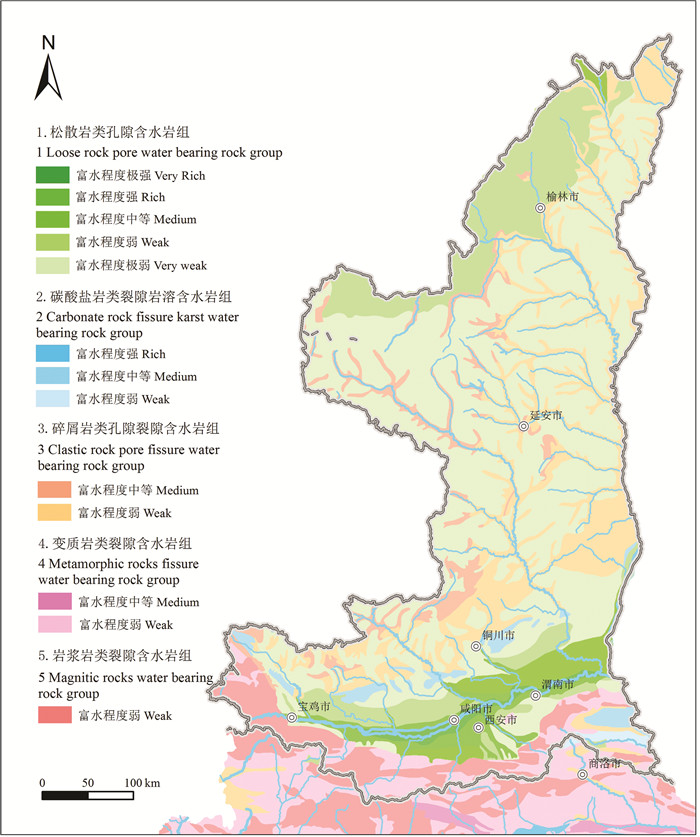
 下载:
下载:
